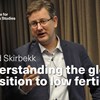low

Vegard Skirbekk: Understanding the global transition to low fertility
Globally, women are having half as many children as they had just fifty years ago. Why have birth rates fallen, and how will low fertility affect our shared future? The vast majority of current resear
Low Fertility and Long Run Growth in an Economy with a Large Public Sector
An important mechanism in low fertility countries is social interactions and its effects on ideal family size; as this is hard to capture in formal models, this paper uses an agent based simulation mo
Research seminar with Vegard Skirbekk: Understanding the global transition to low fertility
Venue: Institutet för framtidsstudier, Holändargatan 13 i Stockholm Research seminar with Vegard Skirbekk, professor at Columbia Aging Center, Columbia University and senior researcher at the Norwegian I
Low fertility and long run growth in an economy with a large public sector
2010. Pp. 183-205, European Journal of Population, vol. 26 (2).

Martin Kolk: Low-fertility countries are responsible for almost all of the CO2 emissions
Do we need to reduce population growth to address the climate challenge? From the perspective that each person contributes to green house gas emissions and resource consumption, it is a logical though
Does Immigration Hurt Low Income Workers? Immigration and Real Wage Income below the 50th Percentile, Sweden 1993-2003
Working Paper 2010 no.6 This paper addresses potential effects of immigration on wage income of predominantly low income Swedish born workers, for which the estimates show mainly a positive relationshi
Religious development from adolescence to early adulthood among Muslim and Christian youth in Germany: A person-oriented approach, Child Development
Child Development Abstract Religious decline, often observed among North American Christian youth, may not apply universally. We examined this and whether religiosity is associated with well-being, risk
Stability or Change in the Swedish Labour Market Regime
This paper will relate the worsened situation for low educated in general, and youth in particular, to two institutional factors: a changed organisation of vocational education in upper secondary scho

Voting behavior, policy responsiveness and democratic anger. Interview with Armin Schäfer
European citizens with low socio-economic status are staying away from the polls in disproportionate numbers. Some of them say it is because politicians don't care about them anyway. Are they right? P
Higher-achieving children are better at estimating the number of books at home: Evidence and implications
Frontiers in Psychology Abstract The number of books at home is commonly used as a proxy for socioeconomic status in educational studies. While both parents’ and students’ reports of the number of books








